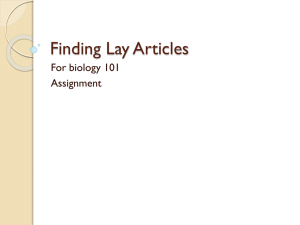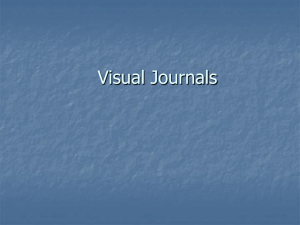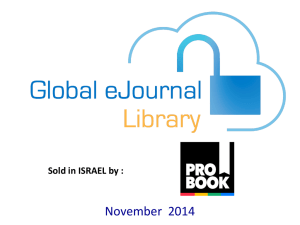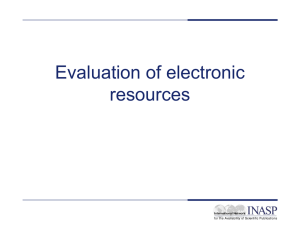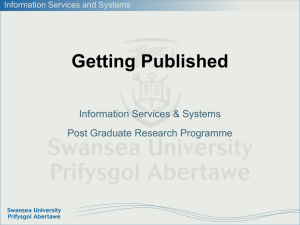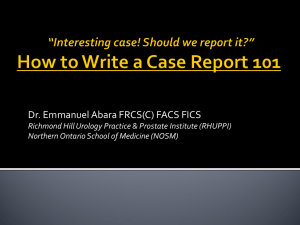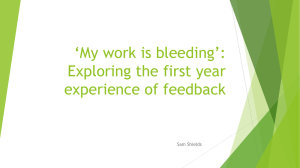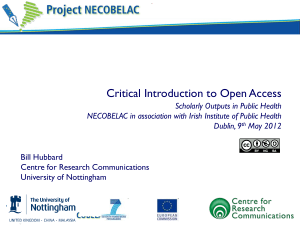Prof Melewar`s slides (PowerPoint, 119KB)
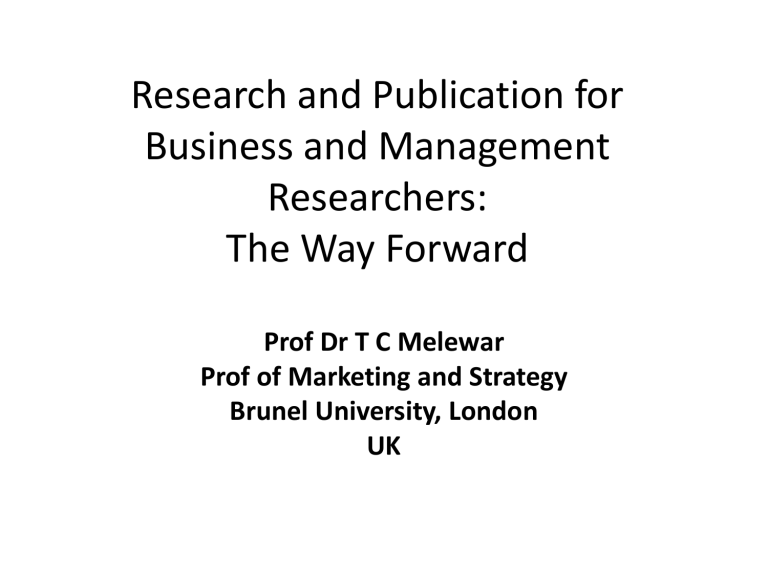
Research and Publication for
Business and Management
Researchers:
The Way Forward
Prof Dr T C Melewar
Prof of Marketing and Strategy
Brunel University, London
UK
Importance of topic
• Universities and staff are ranked based on research and publications outputs (R&P)
• It is about building the academic brand, image and reputation of the university and the person
• For the university: to gain global recognition in terms of academic excellence, attracting bright students at all levels, and income generation
• For the person: promotion purposes, reputation building, become the expert, the research leader
Ranking based on R & P
• Three major outlets, The Times Higher Education
World Ranking, QS World University Ranking and
Shanghai Ranking (Academic Ranking of World
Universities)
• In essence, in our case, important point to consider, research work published in the Social Science Citation
Index (ISI, Institute for Scientific Information)
• Academic journals in SSCI also have their respective impact factors
• Thus, we need to have knowledge about which journals are in SSCI and their respective impact factors
SSCI journals
• They tend to be the top and tough journals to get into
• The higher the impact factor the difficult it is to publish in these journals, for example in business and management, SMJ – 4.464, JIBS
– 3.766, EJM – 0.756
• In B&M, the top journals tend to be American in origin
Non SSCI journals
• This is a dilemma and dichotomy
• Non SSCI yet are recognized by the academic community as good, respectable and high quality
• So, what do you do?
• In my case, I use two standards, ABS and SSCI, with SSCI being the dominant measure
ABS and SSCI
• ABS (Association of Business Schools), UKbased, produced journal quality ranking
• Some journals in ABS are non SSCI; but they are now applying to be part of SSCI e.g. MD
• So I target journals that both fulfill ABS and
SSCI
• This requires some knowledge and information about these outlets
Pressure
• So, we are now under pressure to produce good research (with rigour, robustness yet parsimonious) for academic publication
• Recruitment and promotion of staff are based on publications and journal quality
• It is getting tougher and tougher to get into the top ISI journals compared to ten years ago, why?
Why tough?
• Universities in the US, UK, Germany, Australia,
New Zealand, South Korea and others, now more so than ever, require staff to publish in the ISI journals
• More papers submitted to the very few journals thus, competition is very high
• Creation of new journals – but they are perceived to be low in quality – will take time to establish itself, so, perhaps not
So what to do
• Target journals properly and narrowly
• Read the aims and mission of the journals
• Read papers that are closest to your topic in the targeted journal
• Examine the style of writing of the targeted journal, then, just follow that style
• Fulfill ALL the paper submission requirements (cite JBM)
• Edit, edit and edit . . . Proofread, proofread and proofread
• Send the manuscript to at least two academics who have published in the journal for comments and feedback
Contd.
• Make the necessary revisions
• Submit
• If rejected, read the comments and make the necessary corrections if they make sense, then submit to another appropriate journal, good luck!
• If revise and resubmit – great! celebrate! Treat yourself first then make corrections, detailed corrections!!!
• One revision, two revisions, three revisions . . .!!!
Persevere, be strong and don ’ t give up hope
• Give my JIBS example
Publication strategy
• Submit your best works to the top ISI journals
• Mediocre works in the lesser ranked journals
• At the moment I have at least five papers under review, and am preparing another five for submission
• So, have to work hard (and smart) in producing good research for publication purposes (of course, there are other purposes as well, e.g. contribution to society etc)
Work hard and smart
• Use PhD materials to publish
• I published seven papers from my PhD – from the top journal to the lesser ranked journals (4 ISI and
3 non ISI)
• Simultaneously, work on one project and target journals – I got 1 top ISI and 2 non ISI
• Plus, work on small projects for ISI journals
• Projects with good graduate students – masters and PhDs for ISI journals – good experience for the young scholars and future academics – you guide them
contd
• Once you have gained experience with the top journals, things become easier
• What do I mean by this? You know the rules of the game, then, follow the rules!
• Work with colleagues around the world, to gain exposure and kudos but be mindful of issues of authorship, who comes first, second etc. – sort this out from the outset
contd
• Work with more experience and top colleagues, you meet them at conferences, approach them
• Lead research by, for example, guest editing a special issue, people will know you
• Write research books in your field, this will reinforces your name, expertise, global reach
• And still publish in ISI and good academic journals!!!
University ’ s academic brand, image and reputation
• I will discuss these elements together
• In the UK, Research Excellence Framework (REF) replacing the RAE
• Universities are ranked according to research excellence
(papers published in academic journals and conference proceedings), research environment, indicators of esteem, impact)
• Research funds are allocated as per the ranking
• Not only that the ranking will be publicized in the public domain such as national newspapers, TV, websites
• We can see which university has gone up and down
• This, of course, will directly present the brand, image and reputation of the 130 universities in the UK
Person ’ s academic brand, image and reputation
• You are known by the papers that you have written, the field, where? how many times?
• So it is both quality, quantity and number of times your works have been cited
• You are known for a particular field and your best papers
• Academics around the world will remember you because of these achievements
• You and they construct your brand, image and reputation
University ’ s global recognition
• To attain the top 200, perhaps 100 in the world – a big challenge
• Attracting the brightest students worldwide, the university of choice
• Generating income through research funds, consultancy and government funds (cite
Warwick experience)
Person ’ s global recognition
• Your work is cited
• People will know you; you are an expert/renowned
• Further networking for future research studies
• Present as Keynote Speaker at major conferences
• Advisor for certain public and private bodies
• Become Editor of a journal
There is no turning back
• This is how universities are measured
• This is how you are measured
• Whether we like it or not
• Publications (academic journal papers) is the most objective way in measuring the university and our performance in terms of academic excellence, especially in the social sciences
Last notes
Hard work, smart strategy, consistency and continuity and luck
